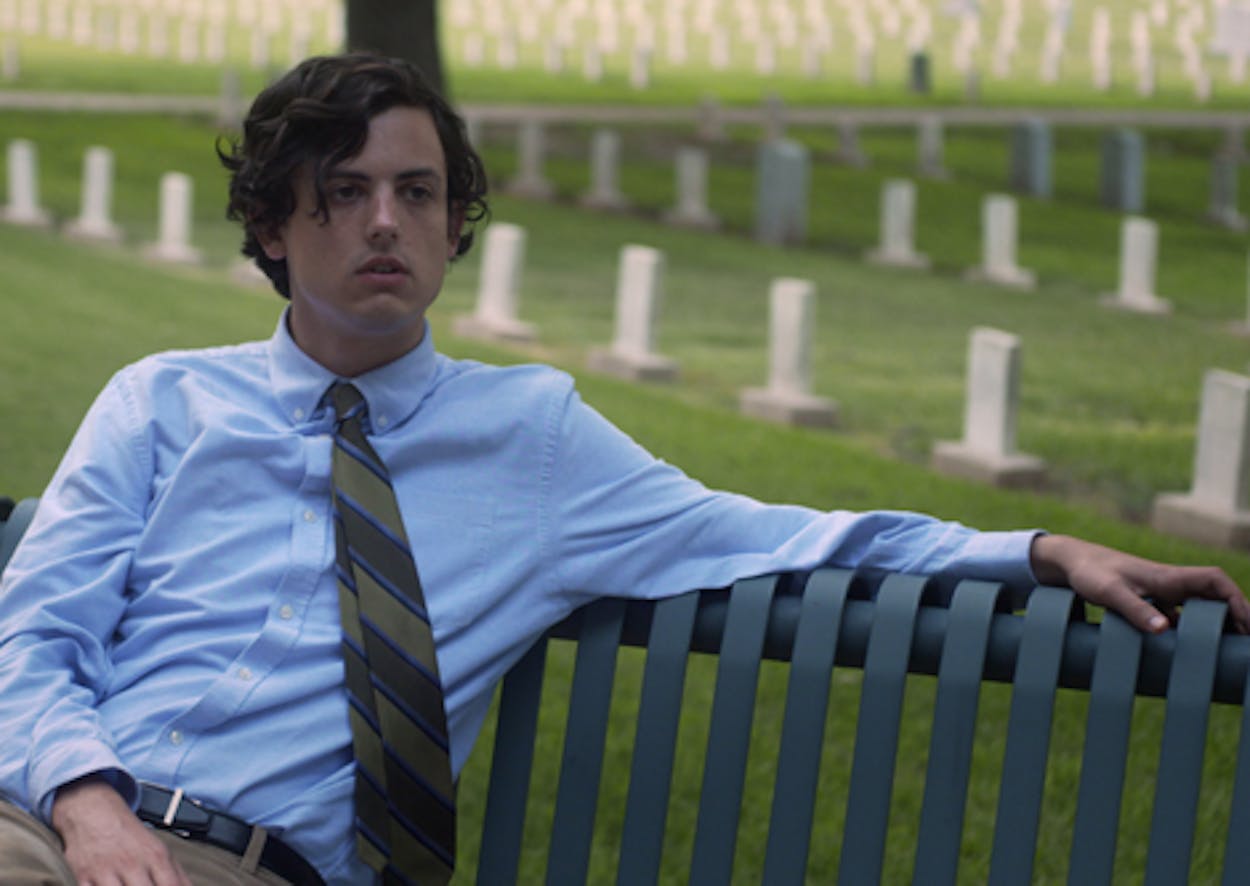Among followers of the independent film scene, the name Bob Byington usually inspires a knowing, if furtive, smile of recognition: The Austin-based writer-director is one of those best-kept secrets that fans prefer to keep to themselves, for fear that if everyone knows about him, he won’t seem nearly as cool.
Byington first gained attention with his third feature, RSO [Registered Sex Offender] (2008), a scabrous faux documentary, shot over the course of eighteen months, that follows a convicted sex offender making a not-exactly-smooth re-entry into society. He followed that with the unexpectedly warm-hearted Harmony and Me (2009), shot in just eighteen days, about a rudderless would-be songwriter sputtering his way through Austin.
Along the way, he has collected an impressive number of industry prizes, including an Annenberg Feature Film Fellowship from the Sundance Institute, and high-profile champions, like the documentarian Michael Moore, who screened both RSO and Harmony and Me at his Traverse City Film Festival in Michigan.
The cultists and hipsters may soon have to make room on the bandwagon. Next Sunday, Byington will premiere his newest feature, Somebody Up There Likes Me, at the South by Southwest film festival in Austin. An appealingly low-key, exceedingly droll comedy about two friends (played by Nick Offerman and Keith Poulson) and the girl (Jess Weixler) who kinda-sorta comes between them, the movie is arguably the most assured expression yet of the writer-director’s eccentric sensibility.
Byington, who described his previous two efforts as having “a certain hand-made quality,” said he hopes he can reach a wider audience with this slightly more traditional effort.
“I’m getting more and more interested in jokes and comedy and making people laugh,” he said in an interview last week.
Byington grew up in Nebraska and attended college at the University of California, Santa Cruz. In the early 1990s, he moved to Austin, where he soon became part of the burgeoning film scene pioneered by the likes of Richard Linklater and Robert Rodriguez. He went on to make two early features, Shameless (1996) and Olympia (1998), though he doesn’t like to talk about them now. (Of Shameless, he said, “I don’t watch it, and I don’t want anyone else to watch it.”)
He eventually made his way to Los Angeles, but after spending a few years there, having little luck getting his projects off the ground, he returned to Austin. He has since developed a style that owes a debt to classic American indies like Linklater’s Slacker and Jim Jarmusch’s Stranger Than Paradise, but also feels connected to a newer generation of “mumblecore” directors, like Andrew Bujalski and Joe Swanberg, who specialize in chatty, angsty comedy-dramas.
In classic low-budget fashion, Byington has been especially successful at drawing on his immediate surroundings to help find his cast, crew, and subject. To wit: he first met Keith Poulson—for whom he expressly wrote the lead in Somebody Up There Likes Me—at the video store where Poulson worked.
“He looked like he was fourteen years old but he had seen everything,” Byington said.
For his part, Poulson—who is also a musician, and had roles in both RSO and Harmony and Me—said he has relished the experience of witnessing Byington’s evolution as a filmmaker.
“My first two movies with him were so improvised, and this one was so scripted,” he said. Poulson added that Byington created “a sense of freedom,” even while asking the actors to stick to the script.
In conversation, Byington can be every bit as offbeat and disarming as one of his films. Reached by phone for a scheduled interview, he opened with a sharply accusatory, “Who are you?” before pausing and chuckling. Throughout the interview, he made repeated suggestions that his questioner should instead write about Offerman, the co-star of Somebody Up There Likes Me, best known for his role as the department director Ron Swanson on “Parks and Recreation.”
“If a filmmaker wants to survive, they do have to create something of an identity, and I’m aware of that,” Byington said. “But Nick is exponentially more well-known than I am, and it just seems sounder to focus the attention on him.”
Yet even if Byington would rather not debate the matter himself, those who have followed the director’s work are curious to see if someone with such an idiosyncratic voice can find mainstream embrace.
“His sense of humor, I don’t even know how to describe,” said Janet Pierson, the producer of the South by Southwest film festival, where RSO also had its world premiere in 2008. “Sometimes you can say a person has a sense of humor like Larry David or Woody Allen or Judd Apatow. But Bob’s sense of humor is like Bob’s.”
As for whether Byington would even know what to do if he suddenly became the talk of Hollywood, that’s another matter entirely. He said he doesn’t want to move back to Los Angeles, and that he has a hard time seeing himself working on projects that aren’t entirely his own.
Then again, he’s not about to rule out anything.
“I can’t imagine saying no if someone asked me to write something for Brad Pitt,” Byington said. He then dryly added, “I would say yes first, then I would hope they sent me a check.”







